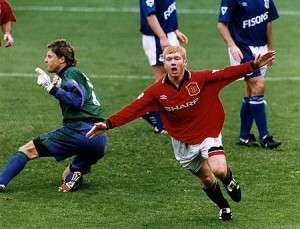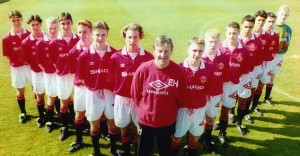When Paul Scholes first joined Manchester United’s youth academy at the age of 14, the trainers had concerns about his size and were hoping for a growth spurt.
 A couple of decades, 676 United first-team appearances and 150 goals later, United’s trainers are still wondering about that growth spurt.
A couple of decades, 676 United first-team appearances and 150 goals later, United’s trainers are still wondering about that growth spurt.
Both Real Madrid/France star Zinedine Zidane and current Barcelona manager Pep Guardiola are known to have credited Scholes as the greatest midfielder of his generation.
Every United fan has a favorite Scholes moment, whether for United or England. For me, it was the way that Scholes elevated his game whenever the United fixtures list said “Liverpool,” “Manchester City,” “Arsenal” or “Aston Villa.”
He terrorized the opponents that United fans love to see terrorized. His 30-yard volley against Villa in 2006 is still a YouTube favorite. He terrorized Argentina star Ariel Ortega at the 2002 World Cup, playing for England, earning man of the match honors.
His retirement, coupled with that of Gary Neville earlier this season, leaves just Ryan Giggs in the United squad from that fabled Class of 1992: Gary’s brother Phil is still at Everton (if only just), Nicky Butt ended his career as a Newcastle United loanee to Birmingham City five years ago and a largely-unknown midfielder named David Beckham apparently is collecting paycheques here in Los Angeles.
(Digression: ever notice how a celebrity’s biggest fan will never meet him, but someone who can’t recognize him will get a great photo opportunity? I had lunch with my friend John a few months ago. He said “So I was just at the Apple store in Century City, and David Beckham was there.” I asked John if he talked to Becks, and he said, “No, I didn’t really know which one he was. But somebody told me he was there.” I thought not being able to recognize Beckham was a mathematical impossibility at this point, like dividing by zero or taking the square root of a negative number.)
Scholes’ retirement also makes a burgeoning hole at United even more glaring. The Class of 1992 are so-called because they represented players who not only grew up in United’s youth academy, they also—bar Beckham—grew up as kids in the greater Manchester area: Scholes in Langley, the Nevilles in Bury, Butt in Gorton and Giggs in Salford (via Cardiff, hence the allegiance to Wales).
Since then, United’s youth academy has provided scant help to the first team. Wes Brown and John O’Shea have developed into decent role players, and the jury is probably still out on the recent harvest including Federico Macheda, Darren Gibson, and Johnny Evans.
But it’s very thin after that.
True, United aren’t the only Premiership squad in this quandary. But just because other title contenders struggle with this question doesn’t mean that it’s just a “sign of the modern era.”
The youth academy does more for United than just produce quality footballers. It produces evangelists for the squad. Athletes always talk about how excited they are to play against the teams they grew up hating as fans; the youth academy instills that spirit into the players at a young age.
Gary Neville famously jeered at the Kop after scoring a goal at Anfield. Anti-Liverpool is in his blood, he later would admit, causing him to elevate his game against the Scousers. Can you imagine any of United’s current back four saying that today, in their Serbian, French or Brazilian accents?
Don’t misinterpret what I’m saying as xenophobia. Far from it: United’s scout team has done a masterful job bringing in players from around the world.
Nobody knew the scrawny teenager Sir Alex Ferguson signed from Sporting Lisbon would turn into Cristiano Ronaldo.
 How many teams passed on a little fellow from Mexico who ended up stealing the starting striker’s job—from the guy who led the Premiership in goals, Dimitar Berbatov?
How many teams passed on a little fellow from Mexico who ended up stealing the starting striker’s job—from the guy who led the Premiership in goals, Dimitar Berbatov?
Even the fabled Class of 1992 needed star imports, including Eric Cantona, Roy Keane, Dwight Yorke, Peter Schmeichel and Ole Gunnar Solkskjaer, to achieve the haul of trophies they did.
But what made United ferocious was the combination of global star power coupled with the club’s values being instilled in the first team’s leadership from a young age. It’s what propelled United to be equally motivated against Reading as Real Madrid, against Bolton as Barcelona.
It’s the edge that is currently missing at Old Trafford. Scholes’ retirement makes it all the more acute.
